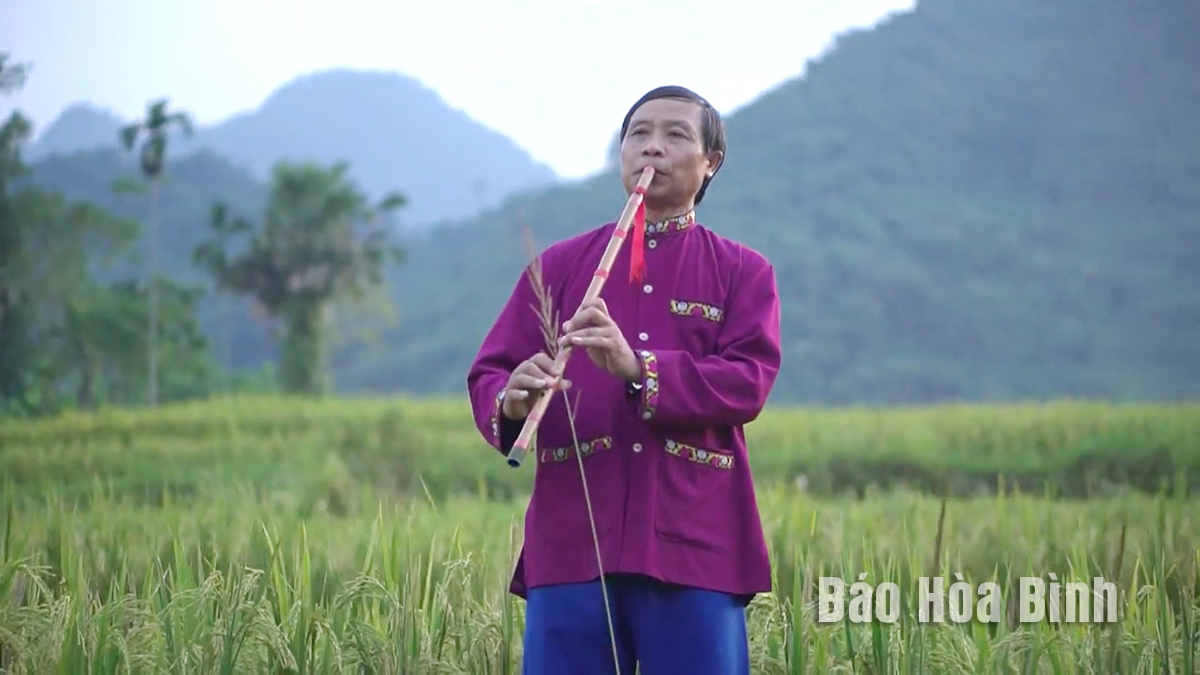
Sao oi (Muong flute), a unique traditional instrument of the Muong ethnic people, calls out the arrival of spring throughout the villages. Its pure and tender tones are reminiscent of the gentle spring breeze, carrying the thoughts and emotions of the highland people of the northwest.
Ha Xuan Trong, from Man Duc town, Tan Lac district, is captivated by melody of Muong flute.
During village gatherings, spring festivals and Tet celebrations, the Muong people often use the Mưong flute to accompany singing, especially lullabies, folk songs, and Muong folk songs.
The Muong flute, also known as "ống ôi" or "kháo ôi" by the Muong people, was ingeniously crafted by generations of skilled artisans, passed down from one generation to the next. Made primarily from bamboo, it has 4 finger holes and 5 musical notes: Ho - Su - Sang - Xe - Cong, and can produce high-pitched tones. Therefore, the sound of the Muong flute is simple and rustic, yet profound and gentle, with its own distinct nuances.
Unlike the bamboo flute, the Muong flute is suitable for Muong folk melodies. The Muong people's flute is likened to a call of love. While Hmong men use the "khèn” and "kèn lá” to express affection and win over girls, Muong men use the Muong flute to convey their feelings of love and affection. Its melodious sound travels from one end of the village to the other; in the forest, on the fields, it echoes from one place to another; by the rivers, streams, it resonates from one bank to the other. In the flute's melody, many words like "ôi" are used, such as ôi hỡi (my friend), ôi hày (oh dear), ôi hạ (oh dear), ôi hởi (oh dear), hỡi ôi (my dear) sounding intimate and sincere. The sound of the Muong flute seems to call out to loved ones, stirring the hearts of Muong girls. Its echoing tones are like expressions of affectionate confession, promises, vows, so deeply resonant! From those heartfelt sounds, the words "ôi" and "ơi" have paved the way for young couples to come together, innocently and passionately, yet filled with love and meaning.
Today, the Muong flute continues to be cherished, refined, and passed down through the skilled hands of Muong artisans across generations. Its resonant sound carries melodies and emotions, heralding the arrival of spring.
Hoa Binh province has carried out multiple programmes and initiatives to revive its cultural heritage which has gradually fallen into oblivion through the ebbs and flows of history.
The most prominent and defining feature in the prehistoric era of Hoa Binh is the Hoa Binh Culture. The Culture was first discovered in Hoa Binh. The significant prehistoric culture represents not only Vietnam but also Southeast Asia and southern China. Through excavations of cave sites in the limestone regions of Hoa Binh, French archaeologist M. Colani introduced the world to a "Stone Age in Hoa Binh province – Northern Vietnam" in 1927. On January 30, 1932, the First Congress of Far Eastern Prehistorians, held in Hanoi, officially recognised the Hoa Binh Culture.
Known as the "Land of Epic History”, Hoa Binh province, the gateway to Vietnam’s northwest, boasts a strategic location and a unique cultural tapestry woven by its ethnic minority communities.
The People's Committee of Luong Son District recently held a ceremony to receive the certificate recognizing Sau Communal House in Thanh Cao Commune as a provincial-level historical and cultural site.
Recognising the importance of cultural heritage preservation in protecting and promoting the value system of Vietnamese culture, and serving socio-economic development in the new period, Party committees and local administrations in Hoa Binh province have identified it as a key task in the cultural development strategy. The province has been making efforts in mobilising resources, creating consensus among people and engaging ethnic communities in preserving and promoting cultural identity.
Hoa Binh province has captured growing attention both domestically and internationally for its distinctive cultural heritage and rich history. Most notably, it has been renowned for its famous Hoa Binh culture, considered the cradle of ancient Vietnamese civilisation. Looking ahead to significant milestones in 2025 and the 140th anniversary of province establishment in 2026, Hoa Binh Newspaper presents a comprehensive overview of the province's development across economic, social, cultural, tourism, and security domains.



